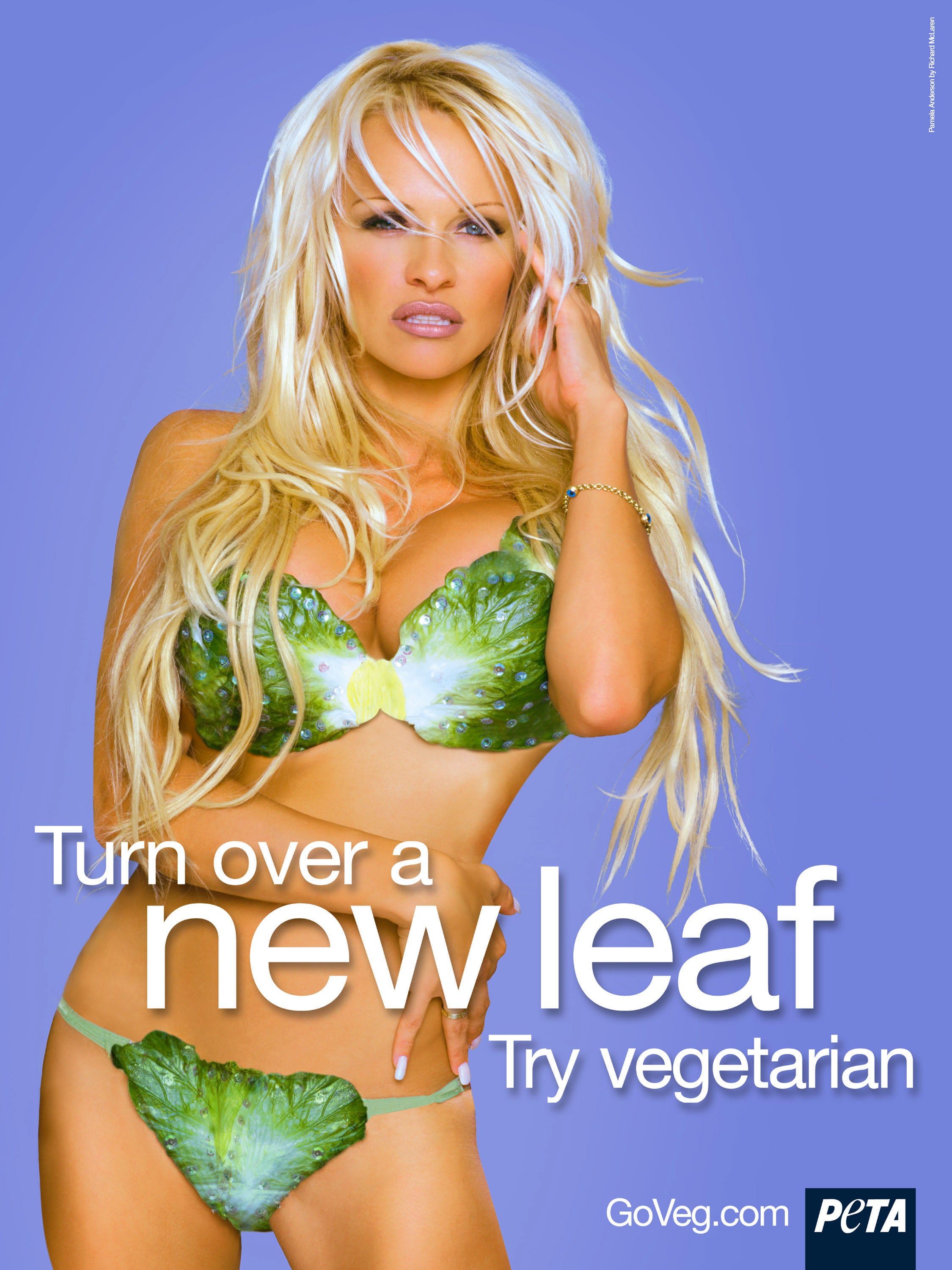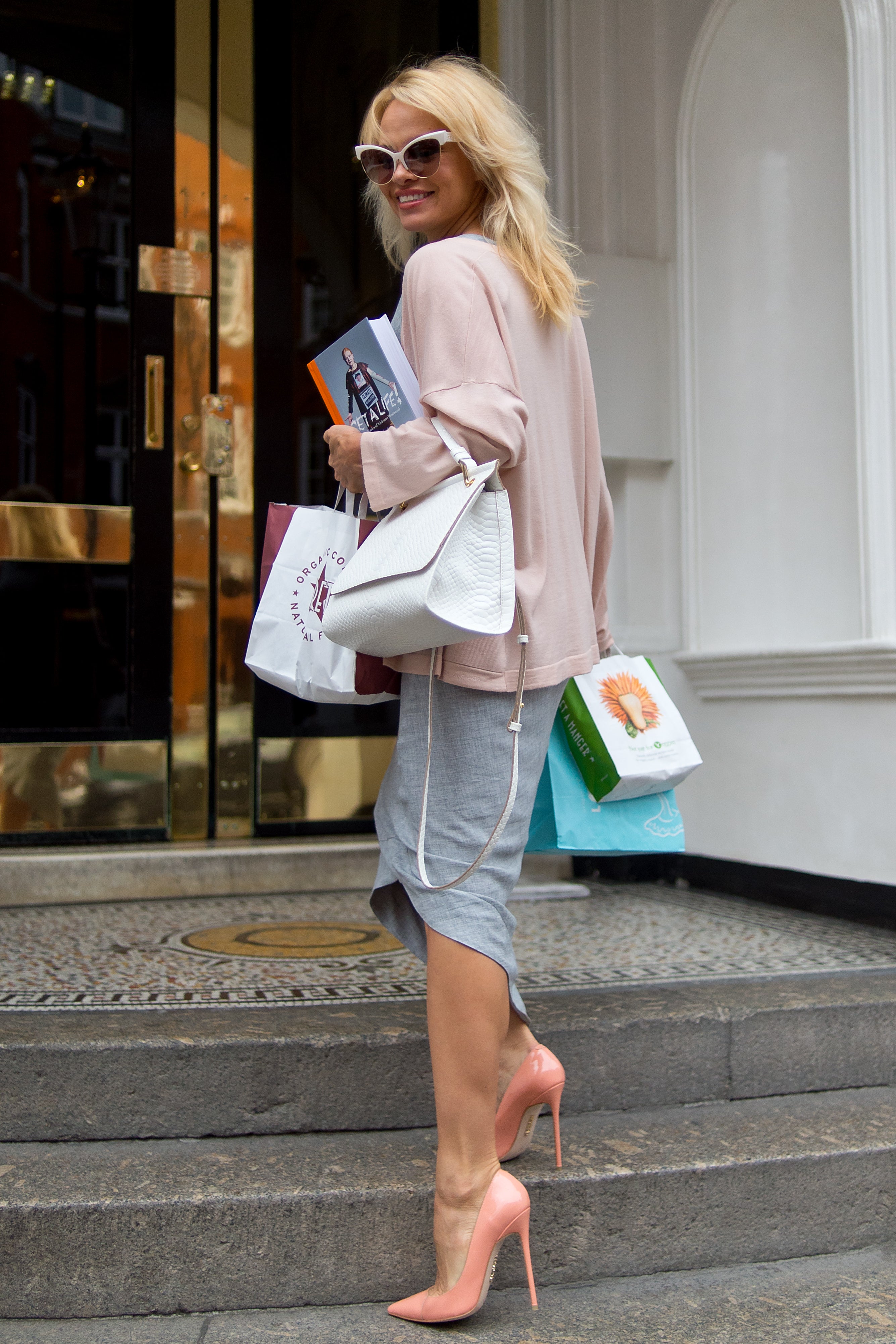‘Activism is sexy’: How Pamela Anderson weaponised the ‘dumb blonde’ as a force for good
From nearly naked billboards for animal charity Peta to her friendship with Julian Assange, the ‘Baywatch’ star’s history as a campaigner has always subverted cultural expectations, writes Katie Rosseinsky


In 1997, Peta received a note written on lilac stationery from a long-time supporter. As a young girl, Pamela Anderson had sent the animal rights charity quarter-dollar coins in the post. Now, thanks to her Playboy covers and role as red swimsuit-wearing, slo-mo-running Malibu lifeguard CJ Parker on Baywatch (viewed by 1.1 billion worldwide at its peak), she was one of the most famous women in the world – and she intended to use her ubiquity to draw attention to the causes she actually cared about.
“I was sick of talking about my boyfriends and my boobs all the time,” the now 55-year-old actor and activist explains in her new Netflix documentary, Pamela, A Love Story. “But I thought, ‘If I can attach it to animal activism or activism for the environment, then it meant something.’” In that handwritten note, Anderson suggested that she join forces with Peta to raise their profile further. Their inaugural collaboration was the organisation’s first-ever billboard in Times Square, New York, showing the model naked apart from a sprinkling of snow and bearing the slogan “give fur the cold shoulder”.
When the ad debuted during New York Fashion Week, Anderson and then husband Tommy Lee were embroiled in high-profile legal wranglings over the theft and distribution of their sex tape (which was stolen from a safe in their home by disgruntled electrician Rand Gauthier, as documented in Pam & Tommy, the recent Hulu series made without Anderson’s approval). The previous year, she had presented The Tonight Show host Jay Leno with a tape of all the times he’d mentioned her and Lee in his opening monologue. Twelve months on and pregnant with her second child, she was the punchline of seedy jokes on just about every late-night talk show.
Picking this moment to launch her campaign showed a pragmatism and self-awareness that has characterised Anderson’s attention-grabbing activism ever since. People were already looking, she reasoned, so why not give them something worthwhile to look at? “I was already getting teased and made fun of – I wanted to take that and use it for good,” she recalls in the documentary. Later, she muses: “Activism is sexy. You’ve got to be brave and you’ve got to use what you’ve got.”
It’s a mission statement she has stuck to for more than 25 years, spotlighting issues from open-net fish farming to better background checks for taxi drivers on ride-hailing apps. In 2005, she championed Aids awareness as the face of MAC’s Viva Glam Aids campaign, posing on top of a Swarovski crystal-encrusted car once owned by Liberace. She launched the Pamela Anderson Foundation in 2014, an organisation dedicated to “human, animal and environmental rights” that has supported causes like Help Refugees, Cool Earth and the California Wildlife Centre (where she has taken a hands-on role, feeding hummingbirds and, in her words, cleaning up “a lot of poop”).
Anderson’s “secret weapon”, she believes, is that when people look at her, they assume she’s a living doll, the embodiment of the “dumb blonde” stereotype. “When someone doesn’t think you’re intelligent but then you form a full sentence, you’re a genius,” she joked at an event in her home country, Canada, in 2019. Take the widespread confusion – and then praise – when she tweeted in support of the Gilets Jaunes, the hi-vis-wearing French populists who protested against fuel tax hikes in 2018. “I despise violence… but what is the violence of all these people and burned luxurious cars compared to the structural violence of the French – and global – elites?” she posted, prompting Kate Aronoff, journalist and author of Overheated: How Capitalism Broke The Planet – And How We Fight Back, to tweet: “Pamela Anderson has an infinitely more substantive take on what’s happening in France than the Wall Street Journal.”
The element of surprise works in Anderson’s favour; reading interviews with her, you get the impression that she delights in confounding expectations. “I speak at the Kremlin or I speak at Vladivostok at the economic conference about green energy and a green economy,” she told The Hollywood Reporter in 2018. “And I don’t know what people are expecting from me. I can talk about whales and the environment, biodiversity of the oceans. I can talk about anything I want because I think people are still looking at me, trying to figure out, ‘Why is she here?’”
Animal rights remain a passion for Anderson, who became a vegetarian when she was a teenager after opening the door to her father’s shed, only to find a decapitated deer hanging upside down. After that first Times Square billboard caused a stir, her partnerships with Peta have seen her don strategically placed pieces of lettuce to promote a plant-based diet (tagline: “Turn over a new leaf”) and recreate the shower scene from Alfred Hitchcock’s Psycho to draw attention to the meat and dairy industry’s water consumption.

In footage from 2004 shown in Pamela, A Love Story, she asks for the support of fans who’ve congregated at a Virgin Megastore to bag a signed copy of her novel Star (“an insider’s look at the world of inflated egos and inflated bodies,” according to publisher Simon & Schuster) – would they sign Peta’s petition to stop the Queen’s guards wearing real bearskin hats? It’s a canny quid pro quo, a signature for a signature. Pammy reportedly wrote a note to Her Majesty to accompany the document, too; her lobbying didn’t work, but she hasn’t given up on the crusade for fake bear pelts, sending Boris Johnson a letter on the subject in 2021.
Anderson’s campaigns have inevitably (and, let’s face it, deliberately) provoked controversy. Peta proudly refer to her as their “weapon of mass distraction” – speaking in 2010, then senior vice president Dan Mathews praised her for having “lured legions of pop culture junkies to Peta’s website and sparked interest in animal issues in a very unique way”. The star sees that ability to draw in a new audience, outside of the activist echo chamber, as her USP. “I reach an audience that’s important,” she told the Los Angeles Times in 2019. “I have a lot of friends who are intellectuals, but they are preaching to the choir.”
Among the most contentious of her shoots was 2010’s “All Animals Have The Same Parts”, showing the bikini-clad Anderson’s body marked up like a butcher’s diagram. When Anderson touched down in Montreal to unveil the image, she learned it had been banned by local officials, who’d criticised it as sexist and objectifying. Her response? “In a city that is known for its exotic dancing and for being progressive and edgy, how sad that a woman would be banned from using her own body in a political protest.”
Her status as a sex symbol – and beacon of sex positivity – meant that when she teamed up with celebrity rabbi Shmuley Boteach to rally against the porn industry in 2016, the unlikely pair generated not insignificant backlash from both sides of the political spectrum. In an open letter, they blamed porn for the breakdown of marriage, describing it as “a boring, wasteful and dead-end outlet for people too lazy to reap the ample rewards of healthy sexuality”. According to The Daily Beast, Anderson’s “condemnation of porn as the source of men’s bad behaviour … [was] based more on hysteria than facts”, and hammered home old-fashioned tropes about gender; conservative critics, meanwhile, implied that her Playboy career (which Anderson has described as “innocent” and “titillating”) and her sex tape (distributed without her consent) rendered her comments hypocritical.
More divisive yet were her pronouncements on #MeToo. Shortly after the New York Times investigation into Harvey Weinstein was published, she told TV host Megyn Kelly that Weinstein’s victims should have known not to enter the producer’s hotel room. “You know what you’re getting into if you’re going into a hotel room alone… Just common sense: don’t go into a hotel room alone,” she said.
Then there’s her unwavering support of WikiLeaks founder Julian Assange. Introduced by mutual friend Vivienne Westwood, their relationship has become a source of controversy given that Assange has been accused of sexual assault, which he denies; the investigation was eventually dropped by Swedish authorities in 2019. It’s also prompted endless fascination. Anderson visited him at the Ecuadorian embassy in London, bringing along a Pret a Manger vegan sandwich (an online conspiracy theory later suggested that Anderson had fatally poisoned Assange with said sandwich), then at Belmarsh Prison, where he has been held since 2019, battling an extradition request.

Were they… together? In an interview with People in 2017, Anderson cleared absolutely nothing up. “Julian is trying to free the world by educating it,” she said. “I understand that our ‘affair’ and the curiosity surrounding that might bring some attention to his situation. That’s fine, but I’d rather not go into private details. Let’s just say everyone deserves love.” The following year, they starred in a bizarre shoot for The Hollywood Reporter; shot by Anderson’s close pal David LaChapelle, the pair appeared bathed in an almost saintly glow, their white-blonde hair tousled by wind machines.
Anderson’s dedication to her causes has taken her to some questionable places. After she wrote to Vladimir Putin in 2009, asking him to stop importing seal products, the president asked her to meet him in Russia, then banned the practice soon after. She pressed him to take action on the whale meat trade six years later, and received another summons to the Kremlin; there, she discussed marine conservation in a televised meeting with Putin’s then right-hand man, Sergei Ivanov. Putin even invited her to his 2012 inauguration ceremony, suggesting she could present him with a bouquet of flowers. (Anderson, otherwise engaged at the time, politely declined).
When that first Peta billboard went up in Times Square more than a quarter of a century ago, celebrity campaigners were a relatively rare breed; now, it’s practically obligatory to be a star-slash-activist. In this changed landscape, Anderson is continuing to put her money where her mouth is, albeit now sometimes from behind the scenes. “I feel a lot of times with activism, especially with celebrities, it becomes more about the celebrity than the actual cause,” she told AnOther in 2020. “I want to do things that actually make a difference, like give money to people on the front lines – less, ‘Look at me, look at me, this is what I believe.’ It’s actually been really successful in helping people. More so now than ever. Not so much me being the poster child for things.”
A sex symbol who’s resolutely anti-porn (but will always fly the flag for Playboy), an animal rights activist who has made alliances with a leader with murky human rights records, a self-described feminist who has said that the movement can go “too far”: it’s hard to condense Anderson’s political views into a coherent, comprehensive manifesto, rife as they often are with incongruities. She’s a walking contradiction, but a fascinating one all the same. Underestimate her at your own peril.
‘Pamela, A Love Story’ is on Netflix from 31 January



Join our commenting forum
Join thought-provoking conversations, follow other Independent readers and see their replies
Comments